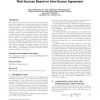Free Online Productivity Tools
i2Speak
i2Symbol
i2OCR
iTex2Img
iWeb2Print
iWeb2Shot
i2Type
iPdf2Split
iPdf2Merge
i2Bopomofo
i2Arabic
i2Style
i2Image
i2PDF
iLatex2Rtf
Sci2ools
WWW
2010
ACM
2010
ACM
SourceRank: relevance and trust assessment for deep web sources based on inter-source agreement
We consider the problem of deep web source selection and argue that existing source selection methods are inadequate as they are based on local similarity assessment. Specifically, they fail to account for the fact that sources can vary in trustworthiness and individual results can vary in importance. In response, we formulate a global measure to calculate relevance and trustworthiness of a source based on agreement between the answers provided by different sources. Agreement is modeled as a graph with sources at the vertices. On this agreement graph, source quality scores—namely SourceRank—are calculated as the stationary visit probability of a weighted random walk. Our experiments on online databases and 675 book sources from Google Base show that SourceRank improves relevance of the results by 25-40% over existing methods and Google Base ranking. SourceRank also reduces linearly with the corruption levels of the sources. Categories and Subject Descriptors H.3.3 Information Se...
Internet Technology | Source Selection | Source Selection Methods | Web Source Selection | WWW 2010 |
| Added | 14 May 2010 |
| Updated | 14 May 2010 |
| Type | Conference |
| Year | 2010 |
| Where | WWW |
| Authors | Raju Balakrishnan, Subbarao Kambhampati |
Comments (0)

